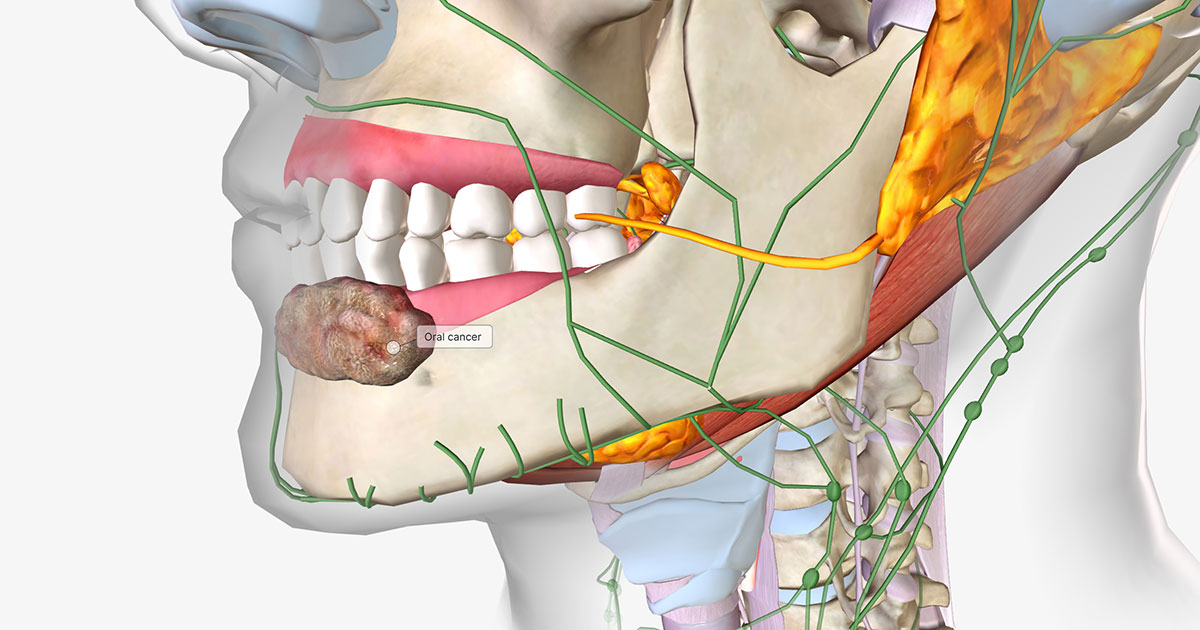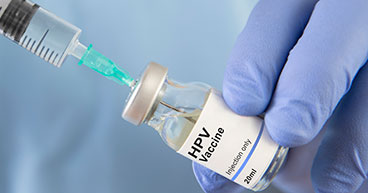
Oral cancers are often challenging and delicate to treat—and not just because they may be hard to reach in the recesses of the mouth. These cancers may make it difficult to speak and eat and have the potential to disfigure the face.
Beomjune Kim, DMD, MD, Head and Neck and Microvascular Reconstructive Surgeon at City of Hope Atlanta, says he approaches each case of oral cancer differently, but with the plan to try to maintain the basic functions of the mouth.
“My first priority is function, because you have to eat and talk,” says Dr. Kim. “Let's say, for example, a patient comes in with mandibular (jawbone) cancer. Then I think about how I'm going to preserve the continuity of the mandible, so he or she can talk and chew. If it's the tongue, I cannot restore the muscular function of the tongue, but at least I can restore the volume and shape of the tongue. There are multiple things I have to think about during the process. It's extremely complex.”
Because of the complexities of oral cancer, patients may have many questions and are likely to go to a search engine for answers. Studies show that before asking their doctor, nearly 90 percent of Americans go to Google to get answers to their questions.
In this article, we’ll answer some of your most-asked oral cancer questions on Google with the help of Dr. Kim. Questions include:
- Is oral cancer the same thing as mouth cancer?
- What does oral cancer look like?
- What causes oral cancer?
- Does vaping cause oral cancer?
- How common is oral cancer?
- What are the oral cancer treatment options?
- What are tongue cancer symptoms?
- Is a white tongue a sign of cancer?
- Should smokers get a regular oral cancer screening?
If you’ve been diagnosed with oral cancer or another head and neck cancer and want to get a second opinion on your diagnosis or treatment options, call us or chat online with a member of our team.
Is oral cancer the same thing as mouth cancer?
“It's actually oral cancer,” Dr. Kim says. “Mouth cancer is kind of a layman's term for oral cancer.”
Searchers also ask which diseases are described by the term “oral cancer.” Dr. Kim says oral cancers include:
- Tongue cancer
- Lip cancer
- Floor of the mouth cancer
- Roof of the mouth cancer
- Buccal mucosal (inner lining of the cheek) cancer
- Gingival cancer
“There are multiple subsets of oral cancers, but anything in the mouth is oral cancer,” Dr. Kim says. “Once you go back behind the tongue, that's oropharyngeal cancer. Some people use oral cancer and oropharyngeal cancer interchangeably, but they are two different cancers.”
Learn more about oral cancer types
What does oral cancer look like? How would patients identify it?
While searchers ask what to “look” for in oral cancer, Dr. Kim says you’re more likely to feel a sign or symptom of the disease before you see it.
“Oral cancer can present itself in many different ways,” he says.
Among the signs and symptoms of oral cancer are:
- Swelling in the mouth or in the tongue
- An ulcer in the mouth, sometimes with bleeding
- White patches in the mouth
- Red lesions
- Ear pain
- Difficulty swallowing
- Voice changes
- Loose teeth
“Cancer kind of destroys everything around it,” Dr. Kim says. “So, if it's destroying the bone surrounding the teeth, they’ll become loose.”
It’s important to see your doctor if you develop these symptoms. Also, maintaining good oral health with regular dentist visits may help spot signs of oral cancer early, when they may be easier to treat.
“People who don't see dentists regularly may develop a big tumor and then get seen by their primary doctor.” Dr. Kim says. “So, when they’re referred, they often have advanced cancer. Patients who are referred by dentists usually come in with smaller, less advanced cancer.”
Learn more about oral cancer symptoms
What causes oral cancer?
Smoking and alcohol use are the two leading risk factors for oral cancer, Dr. Kim says.
“And if you combine them, the effect is synergistic,” he says. “So, it's a lot worse.”
According to a National Institute on Alcohol Abuse and Alcoholism report, smoking and drinking cause approximately 80 percent of cancers of the mouth in men and about 65 percent in women. “For people who both smoke and drink, the danger of mouth and throat cancer increases dramatically,” the report says.
Alcohol may increase the production of certain enzymes that convert tobacco tar into carcinogens. Excessive drinking may also suppress the immune system, and smoking and alcohol combined may compound the inflammation, which is a risk factor for cancer.
Other risk factors for oral cancer include:
- Exposure to ultraviolet light
- Poor nutrition
- Poor oral hygiene
- Genetics
- Immune system suppression
- Graft-versus-host disease (GVHD), which may develop after an allogeneic stem-cell transplant
- Human papillomavirus (HPV) infection
Dr. Kim says HPV infections are linked to 70 percent of throat cancers but only a small percentage of oral cancers.
Learn more about oral cancer risk factors
Does vaping cause oral cancer?
It may be too early to tell. Vaping grew in popularity on the scene relatively recently, especially when compared to the centuries people have smoked tobacco.
“We don't see a strong association with head and neck cancer right now, but we may see the effects 10 or 20 years from now,” Dr. Kim says. “But we don't recommend that anyone vape. It definitely is harmful to the lungs.”
How common is oral cancer?
Here are the numbers:
- About 54,000 new cases of oral cancer are diagnosed each year.
- Oral cancer accounts for about 3 percent of all new cancer diagnoses.
- An estimated 11,230 people died of the disease in 2022.
- Oral cancer accounts for about 2 percent of cancer deaths annually.
- Men are much more likely to be diagnosed with oral cancer (1 in 60) than women (1 in 40).
- The average age of a patient diagnosed with oral cancer is 64.
- The average age of patients who die from oral cancer is 68.
- More than 58 percent of diagnoses occur in Americans 55 to 75 years old.
- The five-year survival rate for a patient diagnosed with oral cancer is 68 percent.
What are the oral cancer treatment options?
Surgery is usually the first line of treatment for oral cancer, Dr. Kim says.
“Surgery is followed by radiation therapy and/or chemotherapy, if necessary,” he says. “Radiation therapy and chemotherapy may also be used for patients who cannot undergo surgery or have very advanced cancer. But oral cancer surgery is the mainstream treatment, if possible.”
Oral cancer surgeries may be very delicate and last from six to 12 hours, Dr. Kim says.
So, why wouldn't a patient be a candidate for surgery?
“Surgery is not an option if the cancer is so big that it extends into a vital organ such as the brain or invades the carotid artery or into the spine,” he says. “If it extends to vital structures like that, then we cannot do surgery. Also, if the patient has a complex medical history, like severe cardiac disease or pulmonary disease, it may be too risky to undergo surgery.”
Other treatment options for oral cancer may include targeted therapy and immunotherapy.
Learn more about oral cancer treatments
What are tongue cancer symptoms?
A common early symptom of tongue cancer is a lump on the tongue that doesn’t go away. Other symptoms include:
- White or red patch on the tongue
- Thickened area on the tongue
- Discomfort or pain in the tongue and/or jaw
- A burning sensation in the tongue
- Numbness
- Bleeding from the tongue
- A feeling that something is caught in the throat
- Swallowing or chewing problems
- Difficulty moving the tongue or jaw
- Trouble speaking
- Chronic bad breath
Learn more about tongue cancer
Is a white tongue a sign of cancer?
Among the many potential signs and symptoms of oral cancer are white patches (leukoplakia) on the tongue, gums or inside the mouth. But other conditions may cause these white patches on the tongue, including:
- Tobacco pouch keratosis
- Thrush. A fungal infection
- Reaction to medications (for example, aspirin directly placed in the cheek)
- Poor oral hygiene
- Infections
Should smokers get a regular oral cancer screening?
According to the American Cancer Society (ACS), there are no set recommendations for oral cancer screenings.
However, it’s a good idea to get regular dental checkups, not just to maintain healthy teeth, but also to have the recesses of the mouth examined for infections or disease.
Smokers especially should check regularly for irregularities in the mouth that may need to be checked by a doctor. “This is very important if you use or have used tobacco, and/or if you routinely drink alcohol, as these put you at much higher risk for these cancers,” the ACS says.
If you’ve been diagnosed with oral cancer or another head and neck cancer and want to get a second opinion on your diagnosis or treatment options, call us or chat online with a member of our team.



